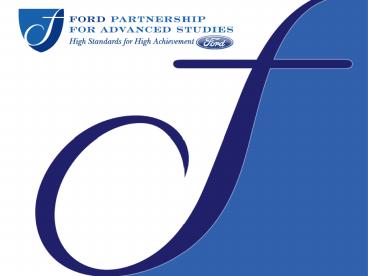Why Ford PAS PowerPoint PPT Presentation
1 / 26
Title: Why Ford PAS
1
(No Transcript)
2
Why Ford PAS?
3
Why Ford PAS?
- The traditional high school experience works for
an increasingly small group of students. - Disadvantaged students are being left farther and
farther behind. - Critical employability skills continue to be left
out of most high school and college curricula.
4
Why Ford PAS? (continued)
- There is little meaningful connection between the
post-secondary and secondary systems. - Employers are increasingly unable to hire the
skilled, diverse workforce they need to compete
in a global 21st century economy. - The pipeline is leaking at both the secondary
and post-secondary levels, in terms of dropout,
remediation, retention, and completion rates.
5
To Sum Up . . .
- For every 100 students entering 9th grade
- 67 finish high school in 4 years
- 38 enroll in college
- 26 return the fall after their freshman year
- 18 complete their degree within 6 years
6
Conclusion
- High school is the pivotal point in
- both the academic and workforce
- development processes.
7
Recommendations for High School Reform
- Rigorous academic curriculum
- Skills necessary for college and work
- Real-world applications
- Extension of learning beyond the classroom
- Vision of college as a possibility
8
What Is Ford PAS?
- Curriculum
- Partnerships
- Technical Assistance
9
The Ford PAS Curriculum
- Consists of
- A 2 ½ -year series of electives beginning in 9th
or 10th grade - 5 semester-long courses, 3 modules each
- 15 modules, each 6 weeks long
- Is flexibleschool, after-school, or summer
program using full curriculum or individual
courses or modules
10
The Ford PAS Curriculum
11
The Ford PAS Curriculum
- Academic Challenge
- Rigorous Content
- National Standards
- Interdisciplinary
12
The Ford PAS Curriculum
- Skills for Success
- Critical Thinking
- Problem-Solving
- Communication
- Teamwork
13
The Ford PAS Curriculum
- Real-World Learning
- Experiences that show how studies lead to college
and rewarding careers - Powerful technology tools
- Important business concepts
- Interactions with business, higher education, and
community organizations - Information about college
14
Ford PAS Course 1 Building Foundations
- From Concept to ConsumerBuilding a Foundation
in Problem-Solving - Media and Messages Building a Foundation of
Communication Skills - People at Work Building a Foundation of
Research Skills
15
Ford PAS Courses 25
- Course 2 Adapting to Change
- Careers, Companies, and Communities
- Closing the Environmental Loop
- Planning for Efficiency
- Course 3 Managing and Marketing with Data
- Planning for Business Success
- Ensuring Quality
- From Data to Knowledge
- Course 4 Designing for Tomorrow
- Reverse Engineering
- Different by Design
- Energy for the Future
- Course 5 Understanding a Global Economy
- The Wealth of Nations
- Markets Without Borders
- Global Citizens
16
Ford PAS Curriculum Materials
- Offered via
- Multimedia
- On-line
17
The Ford PAS CurriculumTeaching/Learning
Philosophy
- Performance-Driven
- Define learning goals that require students to
apply knowledge, skills, and understanding to
carry out long-term projects and create end
products that demonstrate their learning - Assess students learning in multiple ways
18
The Ford PAS CurriculumTeaching/Learning
Philosophy
- Inquiry-Based
- ?
19
The Ford PAS CurriculumTeaching/Learning
Philosophy
- Inquiry-Based
- Pose issues and problems
- Enable students to acquire information and
develop skills in the context of investigating
issues and problems, often through hands-on
experiences
20
Ford PAS More than Curriculum
- Academic rigor, skills for success, and
real-world learning are necessary but not
sufficient to ensure students success. - Institutional support systems provide access for
students to the social and cultural networks
(social capital) that are the conduit to
postsecondary education. - Academic Rigor Social Capital Success
21
The Ford PAS ProgramPartnerships
- National
- Regional
- Community
- High Schools
- Colleges and Universities
- Business
- Community-Based Organizations
22
Community PartnershipsBusiness/Education
Advisory Council (BEAC)
- A BEAC is active at each Ford PAS school/program
site or for each cluster of sites. - The BEAC consists of representatives from local
businesses and higher education, families,
school administrators, and Ford PAS teachers
and students. - BEAC members enhance the curriculum by providing
real-world experiences and opportunities.
23
Role of Ford PAS SiteCoordinator
- Plans Ford PAS program implementation
- Advocates for the Ford PAS program in the
community - Ensures access to Ford PAS learning tools
- Ensures teacher preparedness and provides ongoing
teacher support - Oversees Coordinated Learning Experiences (CLEs)
for Ford PAS students - Serves as liaison with the Ford PAS TA Group
- Participates in broader Ford PAS learning
community - Participates in program documentation and
evaluation - Contributes to capacity building and
sustainability of the program
24
Ford PAS Technical Assistance
- Goals
- Provide support for program implementation
- Create a broader learning community
25
Ford PAS Technical Assistance
- Training/professional development
- Networking
- Toolkits
- Web site www.fordpas.org
- E-mail FordPAS_at_edc.org
- Toll-free number 1-888-338-3267
26
Ford PAS helps students develop academic
knowledge and practical skills that allow them to
enter college and the workforce with confidence
and competence. Jim PadillaPresident and
Chief Operating OfficerFord Motor Company

